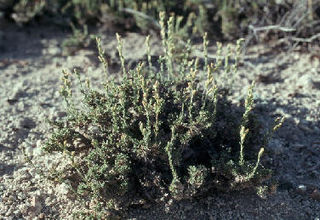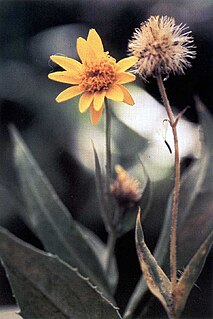
Eurybia macrophylla, commonly known as the bigleaf aster, large-leaved aster, largeleaf aster or bigleaf wood aster, is an herbaceous perennial in the family Asteraceae that was formerly treated in the genus Aster. It is native to eastern North America, with a range extending from eastern and central Canada through the northeastern deciduous and mixed forests of New England and the Great Lakes region and south along the Appalachians as far as the northeastern corner of Georgia, and west as far as Minnesota, Missouri and Arkansas. The flowers appear in the late summer to early fall and show ray florets that are usually either a deep lavender or violet, but sometimes white, and disc florets that are cream-coloured or light yellow, becoming purple as they mature. It is one of the parent species of the hybrid Eurybia × herveyi.
Eurybia radulina, commonly known as the roughleaf aster, is an herbaceous perennial in the family Asteraceae. It is native to western North America, where it is present primarily west of the Cascade Range in both Canada and the United States. Its habitats include dry rock outcrops, slopes, edges of forests, and oak woodlands.

Gaillardia aristata is a North American species of flowering plant in the sunflower family, known by the common names common blanketflower and common gaillardia. This perennial wildflower is widespread across much of North America, from Yukon east to Québec and south as far as California, Arizona, Illinois, and Connecticut, although it may be naturalized rather than native in parts of that range. It is also naturalized in scattered locations in Europe, Australia, and South America.
Heterotheca oregona is a species of flowering plant in the family Asteraceae known by the common name Oregon false goldenaster. It is native to the west coast of Canada and the United States in British Columbia, Washington, Oregon, and California as far south as Los Angeles County.

Agoseris grandiflora is a North American species of flowering plant in the family Asteraceae known by the common names California dandelion, bigflower agoseris, and grassland agoseris.

Symphyotrichum ascendens is a species of flowering plant in the family Asteraceae known by the common names western aster, long-leaved aster, and Rocky Mountain aster. Blooming July–September, it is native to western North America and can be found at elevations of 500–3,200 m (1,600–10,500 ft) in several habitats.
Eucephalus breweri is a North American species in the family Asteraceae known by the common name Brewer's aster. It is native to California where it grows primarily in the Sierra Nevada at subalpine elevations. Its range extends into northwestern Nevada and southwestern Oregon.

Eucephalus engelmannii is a North American species in the family Asteraceae known by the common name Engelmann's aster. It is native to the United States and Canada from Alberta and British Columbia to far northern California and Colorado.

Balsamorhiza sagittata is a North American species of flowering plant in the tribe Heliantheae of the family Asteraceae known by the common name Arrowleaf Balsamroot. It is widespread across western Canada and much of the western United States. A specimen was collected by explorer and botanist Meriwether Lewis near Lewis and Clark Pass in 1806.

Anisocarpus madioides is a North American species of flowering plant in the family Asteraceae known by the common name woodland madia.

Arnica dealbata is a species of Californian plants in the tarweed tribe within the aster family

Artemisia norvegica is a species of flowering plant in the aster family known by the common names alpine sagewort, boreal sagewort, mountain sagewort, Norwegian mugwort, arctic wormwood, and spruce wormwood. It is found in cold locations in Eurasia and high altitudes and high latitudes in North America.

Artemisia pygmaea is a North American species of sagebrush in the aster family known by the common name pygmy sagebrush.

Arnica lanceolata is a North American species of flowering plant in the family Asteraceae, known by the common name clasping arnica or lanceleaf arnica. It has a disjunct (discontinuous) distribution in western North America and northeastern North America.

Bradburia pilosa, the soft goldenaster, is a North American species of flowering plants in the family Asteraceae, native to the south-central United States, primarily the southeastern Great Plains and lower Mississippi Valley, in the states of Texas, Oklahoma, Kansas, Missouri, Arkansas, Louisiana, Tennessee, Mississippi, and Alabama. Additional populations are reported farther east but these appear to be introductions. Its habitats include disturbed roadsides and pine-oak-juniper woods.

Eucephalus ledophyllus is a North American species of flowering plant in the family Asteraceae known by the common name Cascade aster. It is native to Washington, Oregon and northern California in the United States, mostly in the Cascade Mountains. Some of the populations are inside national parks and monuments: Mount Rainier National Park, North Cascades National Park, and Mount St. Helens National Volcanic Monument.
Eucephalus elegans is a North American species of flowering plants in the family Asteraceae known by the common name elegant aster. It is native to the western United States, largely the Great Basin, in the states of Colorado, Idaho, Montana, Nevada, Oregon, Utah, Wyoming.
Eucephalus glaucescens is a North American species of flowering plant in the family Asteraceae known by the common name Klickitat aster. It grows on rocky slopes and in subalpine meadows at high elevations on and near Mount Adams in the south-central part of the US State of Washington.
Eucephalus gormanii is a North American species of flowering plant in the family Asteraceae known by the common name Gorman’s aster. It grows on rocky slopes and on cliffs at high elevations in the Cascade Mountains of the US State of Oregon.
Eucephalus tomentellus is a North American species of flowering plant in the family Asteraceae known by the common name Brickellbush aster or rayless aster. It grows on openings in oak or conifer forests the Siskiyou Mountains of the US States of California and Oregon.













